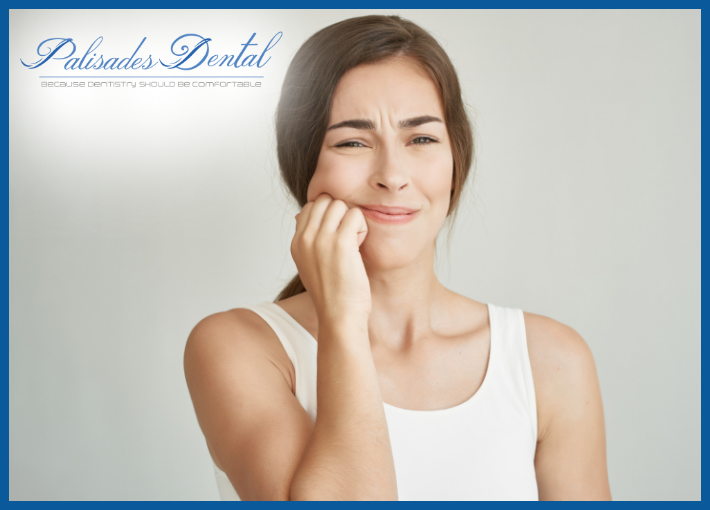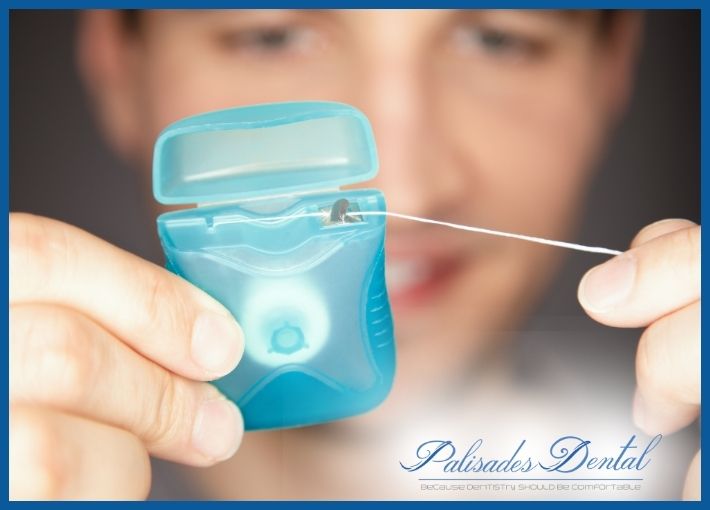Your oral health is a vital component of your overall well-being, and it’s not just about maintaining a sparkling smile. Research has unveiled a profound connection between dental health and your broader physical health. Let’s explore the link between dental care and your overall well-being together — and if you have questions for Dr. Youngquist, he and our team are always here to help.
While we know that regular brushing, flossing and general dental care can prevent common problems such as cavities and gum disease, your teeth can also offer clues to brewing health problems. Discover what your pearly whites can reveal about your health.
1. Damaged tooth enamel can be a sign of eating disorders
Although bulimia and anorexia are most common in girls and young women, recent studies show that about 13 percent of American women over the age of 50 have signs of eating disorders. Serious eating disorders can affect men as well. Bulimia, an illness characterized by a cycle of binge eating and self-induced vomiting, often leads to tooth damage. “Acid created in the stomach by vomiting erodes the inner enamel or thin outer coating of the teeth,” says Leila Jahangiri, clinical professor and chair of the Department of Prosthodontics at New York University College of Dentistry.
The acid will cause damage to the back of the teeth but will usually spare the bottom front teeth. Jahangiri says the damage can be so extensive that the enamel is completely gone and teeth are thinner and can be seriously chipped. Anorexia, another serious illness, is characterized by weight loss, difficulty maintaining an appropriate body weight and distorted body image. Many people with bulimia are also anorexic, says Jahangiri, so those with anorexia may also have damage to their tooth enamel.
2. Pale gums can be a sign of anemia
Anemia is a condition that develops when not enough rich, healthy red blood cells are produced in the body. The low level of red blood cells makes a person with anemia feel weak and tired. It can also cause shortness of breath, dizziness, headaches and an irregular heartbeat. Postmenopausal women are at higher risk of anemia than men due to iron loss. In the United States, approximately 10 percent of the 35 million people over 65 are considered anemic.
Domenica Sweier, clinical professor at the University of Michigan School of Dentistry, says that along with many other medical conditions, anemia can cause the gum tissue to be a very pale pinkish-white. “A dentist might look at the gum color, ask additional questions and would likely refer a patient to a medical doctor,” Sweier says.
It’s important to note, however, that anemia can’t be diagnosed from gum color, but rather should be diagnosed with blood tests.
3. Osteoporosis can put people at risk for tooth loss
Osteoporosis is a bone disease that develops when bone density, mass and structure in the body changes. It can lead to loss of bone strength and risk of bone fractures. Both men and women get the disease, but it’s more common in women as a result of hormonal changes that cause weakening of the bone, which can cause fractures and other skeletal problems.
Fifty-four million Americans have osteoporosis and low bone mass. Half are over the age of 50. Osteoporosis is often called a “silent disease” because many don’t know they have it until bones in the body begin to break.
Erinne Kennedy, director for predoctoral dental education at Kansas City University College of Dental Medicine, says that along with age, genetics, hormonal changes and smoking, osteoporosis can be a risk factor for tooth loss.
Mary Grace Ash, clinical lecturer at the University of Michigan School of Dentistry and course director of gerontology for dental hygienists, says, “There are lots of bones around a tooth, and indications of osteoporosis include tooth recession, mobility and increase in pockets between teeth,” she says. “And a dentist should be able to spot it.”
Tooth loss, however, is not always a sign of osteoporosis. Many other conditions can cause the loss of teeth as people age.
4. Complications of kidney disease can lead to tooth loss
The kidneys are bean-shaped, fist-sized organs that filter extra water and waste out of the blood and make urine. When the blood can’t be filtered properly, the result is kidney disease. Symptoms include dryness of the mouth, changes in taste and malnutrition.
People who have kidney disease often have compromised immune systems and chronic inflammation. A compromised immune system is susceptible to the overgrowth of bacteria or fungus in the body, which can lead to periodontal disease, Sweier says.
Periodontal or gum disease is a common bacteria-induced inflammatory disease that causes bleeding gums, wobbly teeth and tooth loss. Some research shows that those with inflammation of the gums have more compromised kidney function. Additionally, recent studies show that inflamed gums provide an opportunity for bacteria to enter the bloodstream.
5. Oral thrush can be a sign of HIV

Oral thrush is a fungal infection caused by a fungus called candida, which is normally present in low numbers in the mouths of many people. The problem arises when there’s an overgrowth of candida. This can be caused by several factors, including a compromised immune system. “When present, oral thrush may cause burning and soreness in the mouth and throat, making it difficult to eat,” says Ash. Because people with HIV/AIDS have compromised immune systems, oral thrush is sometimes a sign of the disease. The National Center for Biotechnology Information estimates that around 80 to 90 percent of people with HIV will have oral thrush.
If people with HIV/AIDS practice good oral hygiene and have their mouths checked regularly, symptoms can be discovered and treated early.
6. Acid reflux can cause damage to tooth enamel
Acid reflux occurs when the contents of your stomach or stomach acid regurgitates into the esophagus. Symptoms can run from nonexistent to mild to heartburn, or what’s known as acid indigestion, which tends to be more common as people age. About 20 percent of Americans suffer from acid reflux. A dentist should be able to detect tooth damage by erosion from acid reflux right away.
Jahangari says the damage from acid will appear on the back of the upper and some of the bottom teeth. “You may feel little holes or notches on your back molars, but generally the tongue protects the bottom front teeth,” she adds. The erosion of tooth enamel caused by acid reflux can cause sensitivity to hot, cold or sweet foods and drink, chipped teeth or sharp tooth edges, discoloration or darkening of the teeth, and thinning and shortening teeth, which can cause changes in your bite or pain and irritation in your mouth.
7. Poor dental hygiene is linked to cognitive decline
Poor oral hygiene can be a sign of cognitive decline, especially in those who have previously taken good care of their teeth. As brushing, flossing and dental visits become more difficult, the ability to maintain the health of the teeth lessens, says Ash. Research has also linked tooth loss to a higher risk of dementia. Ash says when an older person who has previously taken good care of his or her teeth has food debris in the mouth, the lack of self-care could indicate decline. Caregiver support may be needed.
8. Teeth grinding can be a sign of sleep apnea
Sleep apnea is a common disorder that causes breathing to stop or become very shallow during sleep. Pauses in breathing may last from a few seconds to minutes and may happen 30 times or more during an hour. The National Sleep Foundation has found that 1 in 4 people with sleep apnea also grind their teeth at night. Symptoms include snoring, teeth grinding and gasping.
Untreated sleep apnea is linked to serious health problems including high blood pressure, type 2 diabetes, liver problems and possibly even dementia. “It’s amazing what we can learn from studying teeth,” Kennedy says, “and what we learn just may save your life.”
Prioritize your dental health for a brighter, healthier future. Let our experienced dental team guide you on the path to a confident smile and improved overall health. Schedule an appointment with our general dentistry in Utah at 801-756-1009. For more oral health tips, follow us at @palisadesdentaltake.
Reference: [https://www.aarp.org/health/healthy-living/info-2022/dental-health-and-health.html]









